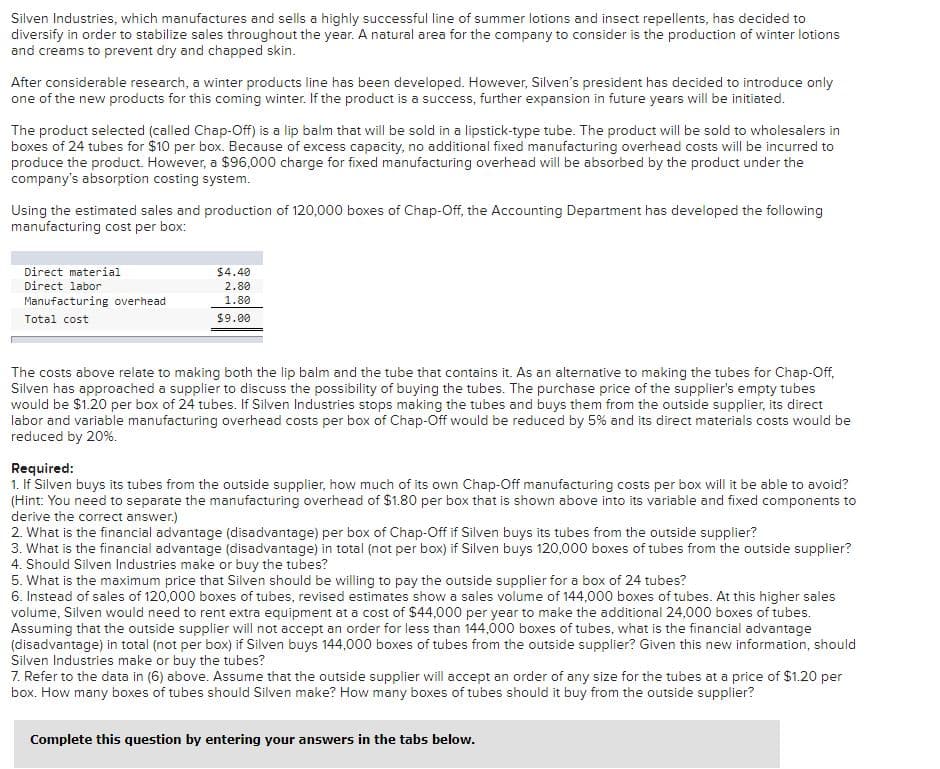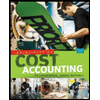Silven Industries, which manufactures and sells a highly successful line of summer lotions and insect repellents, has decided to diversify in order to stabilize sales throughout the year. A natural area for the company to consider is the production of winter lotions and creams to prevent dry and chapped skin. After considerable research, a winter products line has been developed. However, Silven's president has decided to introduce only one of the new products for this coming winter. If the product is a success, further expansion in future years will be initiated. The product selected (called Chap-Off) is a lip balm that will be sold in a lipstick-type tube. The product will be sold to wholesalers in boxes of 24 tubes for $10 per box. Because of excess capacity, no additional fixed manufacturing overhead costs will be incurred to produce the product. However, a $96,000 charge for fixed manufacturing overhead will be absorbed by the product under the company's absorption costing system. Using the estimated sales and production of 120,000 boxes of Chap-Off, the Accounting Department has developed the following manufacturing cost per box: Direct material $4.40 2.80 Direct labor Manufacturing overhead 1.80 Total cost $9.00 The costs above relate to making both the lip balm and the tube that contains it. As an alternative to making the tubes for Chap-Off, Silven has approached a supplier to discuss the possibility of buying the tubes. The purchase price of the supplier's empty tubes would be $1.20 per box of 24 tubes. If Silven Industries stops making the tubes and buys them from the outside supplier, its direct labor and variable manufacturing overhead costs per box of Chap-Off would be reduced by 5% and its direct materials costs would be reduced by 20%. Required: 1. If Silven buys its tubes from the outside supplier, how much of its own Chap-Off manufacturing costs per box will it be able to avoid? (Hint: You need to separate the manufacturing overhead of $1.80 per box that is shown above into its variable and fixed components to derive the correct answer.)
Silven Industries, which manufactures and sells a highly successful line of summer lotions and insect repellents, has decided to diversify in order to stabilize sales throughout the year. A natural area for the company to consider is the production of winter lotions and creams to prevent dry and chapped skin. After considerable research, a winter products line has been developed. However, Silven's president has decided to introduce only one of the new products for this coming winter. If the product is a success, further expansion in future years will be initiated. The product selected (called Chap-Off) is a lip balm that will be sold in a lipstick-type tube. The product will be sold to wholesalers in boxes of 24 tubes for $10 per box. Because of excess capacity, no additional fixed manufacturing overhead costs will be incurred to produce the product. However, a $96,000 charge for fixed manufacturing overhead will be absorbed by the product under the company's absorption costing system. Using the estimated sales and production of 120,000 boxes of Chap-Off, the Accounting Department has developed the following manufacturing cost per box: Direct material $4.40 2.80 Direct labor Manufacturing overhead 1.80 Total cost $9.00 The costs above relate to making both the lip balm and the tube that contains it. As an alternative to making the tubes for Chap-Off, Silven has approached a supplier to discuss the possibility of buying the tubes. The purchase price of the supplier's empty tubes would be $1.20 per box of 24 tubes. If Silven Industries stops making the tubes and buys them from the outside supplier, its direct labor and variable manufacturing overhead costs per box of Chap-Off would be reduced by 5% and its direct materials costs would be reduced by 20%. Required: 1. If Silven buys its tubes from the outside supplier, how much of its own Chap-Off manufacturing costs per box will it be able to avoid? (Hint: You need to separate the manufacturing overhead of $1.80 per box that is shown above into its variable and fixed components to derive the correct answer.)
Managerial Accounting
15th Edition
ISBN:9781337912020
Author:Carl Warren, Ph.d. Cma William B. Tayler
Publisher:Carl Warren, Ph.d. Cma William B. Tayler
Chapter7: Variable Costing For Management
analysis
Section: Chapter Questions
Problem 2PA: The demand for solvent, one of numerous products manufactured by Logan Industries Inc., has dropped...
Related questions
Question
100%
ch6_hw_qa4_part1_sh

Transcribed Image Text:Silven Industries, which manufactures and sells a highly successful line of summer lotions and insect repellents, has decided to
diversify in order to stabilize sales throughout the year. A natural area for the company to consider is the production of winter lotions
and creams to prevent dry and chapped skin.
After considerable research, a winter products line has been developed. However, Silven's president has decided to introduce only
one of the new products for this coming winter. If the product is a success, further expansion in future years will be initiated.
The product selected (called Chap-Off) is a lip balm that will be sold in a lipstick-type tube. The product will be sold to wholesalers in
boxes of 24 tubes for $10 per box. Because of excess capacity, no additional fixed manufacturing overhead costs will be incurred to
produce the product. However, a $96,000 charge for fixed manufacturing overhead will be absorbed by the product under the
company's absorption costing system.
Using the estimated sales and production of 120,000 boxes of Chap-Off, the Accounting Department has developed the following
manufacturing cost per box:
Direct material
$4.40
2.80
Direct labor
Manufacturing overhead
1.80
Total cost
$9.00
The costs above relate to making both the lip balm and the tube that contains it. As an alternative to making the tubes for Chap-Off,
Silven has approached a supplier to discuss the possibility of buying the tubes. The purchase price of the supplier's empty tubes
would be $1.20 per box of 24 tubes. If Silven Industries stops making the tubes and buys them from the outside supplier, its direct
labor and variable manufacturing overhead costs per box of Chap-Off would be reduced by 5% and its direct materials costs would be
reduced by 20%.
Required:
1. If Silven buys its tubes from the outside supplier, how much of its own Chap-Off manufacturing costs per box will it be able to avoid?
(Hint: You need to separate the manufacturing overhead of $1.80 per box that is shown above into its variable and fixed components to
derive the correct answer.)
2. What is the financial advantage (disadvantage) per box of Chap-Off if Silven buys its tubes from the outside supplier?
3. What is the financial advantage (disadvantage) in total (not per box) if Silven buys 120,000 boxes of tubes from the outside supplier?
4. Should Silven Industries make or buy the tubes?
5. What is the maximum price that Silven should be willing to pay the outside supplier for a box of 24 tubes?
6. Instead of sales of 120,000 boxes of tubes, revised estimates show a sales volume of 144,000 boxes of tubes. At this higher sales
volume, Silven would need to rent extra equipment at a cost of $44,000 per year to make the additional 24,000 boxes of tubes.
Assuming that the outside supplier will not accept an order for less than 144,000 boxes of tubes, what is the financial advantage
(disadvantage) in total (not per box) if Silven buys 144,000 boxes of tubes from the outside supplier? Given this new information, should
Silven Industries make or buy the tubes?
7. Refer to the data in (6) above. Assume that the outside supplier will accept an order of any size for the tubes at a price of $1.20 per
box. How many boxes of tubes should Silven make? How many boxes of tubes should it buy from the outside supplier?
Complete this question by entering your answers in the tabs below.

Transcribed Image Text:Complete this question by entering your answers in the tabs below.
Req 1
Reg 2
Req 3
Req 4
Req 5
Reg 6
Req 7
If Silven buys its tubes from the outside supplier, how much of its own Chap-Off manufacturing costs per box will it be able to
avoid? (Hint: You need to separate the manufacturing overhead of $1.8 per box that is shown above into its variable and fixed
components to derive the correct answer.) (Do not round intermediate calculations. Round your answer to 2 decimal places.)
Avoidabie manufacturing costs per box of Chap-Off
Expert Solution
This question has been solved!
Explore an expertly crafted, step-by-step solution for a thorough understanding of key concepts.
This is a popular solution!
Trending now
This is a popular solution!
Step by step
Solved in 2 steps with 2 images

Knowledge Booster
Learn more about
Need a deep-dive on the concept behind this application? Look no further. Learn more about this topic, accounting and related others by exploring similar questions and additional content below.Recommended textbooks for you

Managerial Accounting
Accounting
ISBN:
9781337912020
Author:
Carl Warren, Ph.d. Cma William B. Tayler
Publisher:
South-Western College Pub

Principles of Cost Accounting
Accounting
ISBN:
9781305087408
Author:
Edward J. Vanderbeck, Maria R. Mitchell
Publisher:
Cengage Learning

Principles of Accounting Volume 2
Accounting
ISBN:
9781947172609
Author:
OpenStax
Publisher:
OpenStax College

Managerial Accounting
Accounting
ISBN:
9781337912020
Author:
Carl Warren, Ph.d. Cma William B. Tayler
Publisher:
South-Western College Pub

Principles of Cost Accounting
Accounting
ISBN:
9781305087408
Author:
Edward J. Vanderbeck, Maria R. Mitchell
Publisher:
Cengage Learning

Principles of Accounting Volume 2
Accounting
ISBN:
9781947172609
Author:
OpenStax
Publisher:
OpenStax College

Cornerstones of Cost Management (Cornerstones Ser…
Accounting
ISBN:
9781305970663
Author:
Don R. Hansen, Maryanne M. Mowen
Publisher:
Cengage Learning

Managerial Accounting: The Cornerstone of Busines…
Accounting
ISBN:
9781337115773
Author:
Maryanne M. Mowen, Don R. Hansen, Dan L. Heitger
Publisher:
Cengage Learning